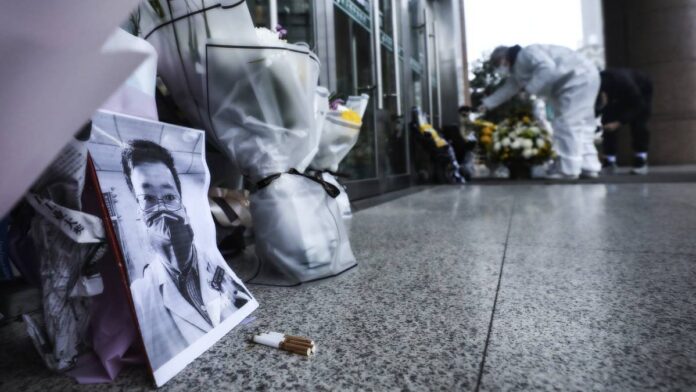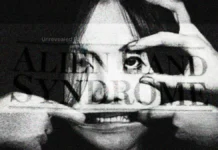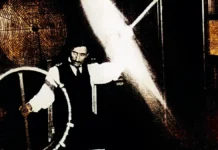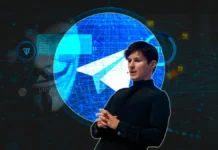The Whistleblower doctor, who tried to warn about the deadly coronavirus outbreak first, was later infected by the virus while working at Wuhan Central Hospital and died. Soon after his death many conflicting reports that he had shared the reports with his friends and other doctors on 30 December, before the pandemic, then why did the police warn him to stop “making false comments on the Internet about unconfirmed SARS outbreak”?, Why Chinese authority never took it seriously?. People questioned, why the authorities silenced the doctors who had given earlier warnings. If they had done so, the outbreak would have not become a pandemic.
The outbreak was later confirmed to be a new coronavirus, SARS-CoV-2 we call it COVID-19, which has spread globally, and by early June 2020, five more doctors from the Wuhan hospital called to be a whistleblower, had died from COVID-19.
A tragic question was raised in the case of Whistleblower Dr. Li Wenliang. learn more in this article…
Contents
Who was Dr. Li Wenliang?
Dr. Li Wenliang was an ophthalmologist, who worked at Wuhan Central Hospital, where the early COVID-19 outbreak was started. He was born in a Manchu family in Beizhen, Jinzhou, Liaoning, China, on 12 October 1986. In 2004, after graduation from Beizhen High School, he attended Wuhan University School of Medicine as a clinical medicine student in a seven-year combined bachelor’s and master’s degree program.
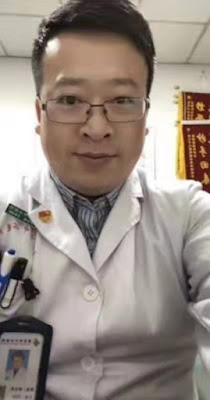
Photo courtesy of interviewees
He was also a member of the Communist Party of China which he joined in his second year. According to his teacher and classmates, he was a diligent and honest student, he loved basketball. In 2011, after graduation, Li started working at the Xiamen Eye Center of Xiamen University, where he worked for three years. Dr. Li Wenliang became an ophthalmologist at Wuhan Central Hospital in Wuhan In 2014.
Whistleblower Dr. Li Wenliang
After several mysterious pneumonia cases discovered in the Wuhan city that confused many doctors in late December. On 30 December 2019, the Wuhan CDC sent out an internal notice to all Wuhan hospitals to be alerted and started an investigation into the exact cause of pneumonia. On the other side, Dr. Li Wenliang received an internal diagnostic report of a suspected Severe Acute Respiratory Syndrome (SARS) patient, that report showed a positive result with a high confidence level for SARS coronavirus tests.
Dr. Li then shared this report with his friends and other doctors and also requested them to keep it confidential, and tried to warn everyone. In his message, he wrote and posted the patient’s examination report and CT scan image in a private WeChat group of his medical school classmates:
Dr. Li Wenliang‘s messages in the “Wuhan University Clinical Medicine 2004” WeChat group on 30 December 2019
( 17:43 Chinese Standard Time, 30 December 2019 )
- Dr. Li: There are 7 confirmed cases of SARS at Huanan Seafood Market.
- Dr. Li: (Picture of diagnosis report)
- Dr. Li: (Video of CT scan results)
- Dr. Li: They are being isolated in the emergency department of our hospital’s Houhu Hospital District.
( 18:42 Chinese Standard Time, 30 December 2019 )
- Someone: Be careful, or else our chat group might be dismissed.
- Dr. Li: The latest news is, it has been confirmed that they are coronavirus infections, but the exact virus is being subtyped.
- Dr. Li: Don’t circulate the information outside of this group, tell your family, and loved ones to take precautions.
- Dr. Li: In 1937, coronaviruses were first isolated from chicken…
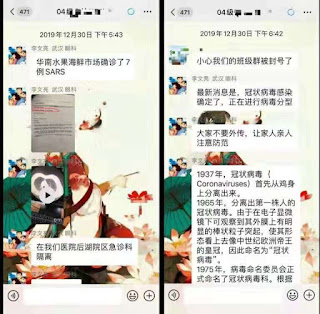
Photo courtesy of interviewees
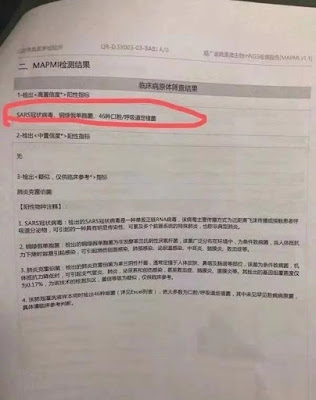
Photo courtesy of interviewees
Read the full report here: The Beijing News report of Dr. Li.
Dr. Li told the WeChat group members to inform their families and friends to take protective measures and requested them to keep it confidential, still, screenshots of his WeChat messages were spread on the Chinese Internet and the post went viral.
Later he was called to be a “Whistleblower” when that shared report circulated publicly, although he requested to keep it confidential from those he shared the information with; however, rumors of a deadly SARS outbreak spread on Chinese social media. He was upset when the discussion gained a wider audience than he had hoped. However, the supervision department of his hospital summoned him for a talk and blamed him for leaking the information.
and as rumors spread, Wuhan police of the Public Security Bureau summoned and warned Dr. Li Wenliang for “making false comments on the Internet about unconfirmed SARS outbreak”.
Wuhan Public Security Bureau investigation
On 3 January 2020, Wuhan Public Security Bureau police interrogated Dr. Li issued a formal written warning(attached below), and censured him for spreading false messages about several confirmed SARS cases at the Huanan Seafood Market. He was also made to sign a letter of admonition promising not to do it again. The police warned him that any resistant behavior would result in prosecution.
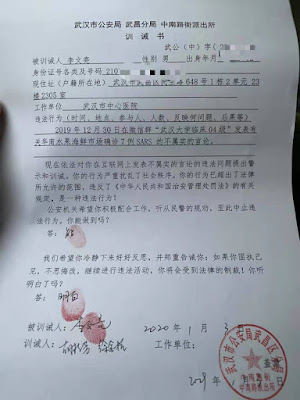
Photo courtesy of interviewees.
Wuhan Police Bureau ordered Dr. Li to stop “spreading rumors” about SARS, co-signed by Dr. Li and two officers. Dr. Li uploaded it to his Sina Weibo account.
On 31 January 2020, he wrote his experience in the police station with a letter of admonition on social media. soon his post went viral, and users questioned why the authorities silenced the doctors who gave earlier warnings.
How was Dr. Li Wenliang infected by the virus?
After the warning of the police, Dr. Li returned to his work at the hospital, but unfortunately, on 8 January, Dr. Li was infected by the virus while he was treating an infected patient at the hospital. The patient whom Dr. Li treated suffered from acute angle-closure glaucoma and developed a fever and Dr. Li developed a fever and cough two days later, which soon became critical.
Dr. Yu Chengbo, a Zhejiang medical expert, told the media that the glaucoma patient whom Dr. Li saw on 8 January was a storekeeper at Huanan Seafood Market with a high viral load, which could be the reason for Dr. Li’s infection.
Dr. Li was admitted to Houhu Hospital District, Wuhan Central Hospital to intensive care on 12 January, where he was quarantined and treated. He tested positive for the novel coronavirus(COVID-19) on 30 January and was formally diagnosed with the virus infection on 1 February. Dr. Li posted a message online vowing to return to the front lines after his recovery, while he was hospitalized.
Dr. Li’s friend said, “Dr. Li’s condition became critical on 5 February, and on 6 February, while Dr. Li was on the phone with me, he told me that he was having trouble breathing and that his oxygen saturation had dropped to 85%“.
Dr. Li Wenliang’s death
On 6 February, at around 19:00, he was sent to the emergency room, and to keep him alive, Extracorporeal membrane oxygenation (ECMO) was reportedly used, but unfortunately, this effort was unsuccessful.
Contradiction came when China Newsweek said that his heartbeat stopped at 21:30 and on the other side Chinese state media shared in social media posts, that Dr. Li Wenliang had died, but the posts were soon deleted.
Later, Wuhan Central Hospital released a statement contradicting reports of his death: “In the process of fighting the coronavirus, the eye doctor from our hospital Dr. Li Wenliang was unfortunately infected. He is now in critical condition and we are doing our best to rescue him.”
The hospital formally announced that Dr. Li Wenliang had died from the disease at 2:58 a.m. on 7 February 2020, at age 33. During these confusions, more than 17 million people were watching the livestream for his status updates.
Whistleblower hospital
Dr. Li Wenliang became the first of six doctors to die from the novel coronavirus(COVID-19) in the Wuhan Hospital since the hospital has been nicknamed the “whistleblower hospital”. Hu Weifeng, a urologist and coworker of Dr. Li Wenliang became the sixth doctor of the hospital to die from the virus on 2 June 2020, after four months of hospitalization.
On 1 February 2020, the Italian newspaper La Stampa reported the documentation of Dr. Li Wenliang’s blog where he posted his discoveries but Dr. Li was already in the attention of the Chinese media because he was thought to be one of the eight rumors mongers, who warned by the Wuhan police.
According to some media reports and news, Wuhan police summoned eight rumor mongers on 1 January, while Dr. Li and Xie Linka, another doctor from Wuhan Union Hospital, were warned on 3 January, meaning that the later two Dr. Li and Xie Linka, might not be part of the group.
Dr. Li later responded that he did not know whether he was one of the so-called “rumor mongers,” but that he had been admonished for claiming a SARS outbreak, which at that time was unconfirmed. The police punishment of Dr. Li for “rumor-mongering” was aired on China Central Television, signaling central government endorsement for the reprimand, according to two reporters for the South China Morning Post.
The Chinese Supreme People’s Court said on 4 February, that the eight Wuhan citizens should not have been punished as what they said was not entirely false. It wrote on a social account, “It might have been a fortunate thing if the public had believed the ‘rumors’ then and started to wear masks and carry out sanitization measures, and avoid the wild animal market.”
Dr. Li told to Caixin Media that he was worried that the hospital would punish him for spreading rumors, but felt relieved after the Supreme People’s Court publicly criticized the Wuhan police. He also said that he thinks that there should be more than one voice in a healthy society, and he won’t approve of the use of public power for excessive interference in society.
From where the report originated
According to the Chinese magazine, the report originated from Dr. Ai Fen, director of the emergency department at Wuhan Central Hospital, who became frightened after receiving laboratory results of a patient whom she had examined, she examined that the patient exhibited symptoms like influenza resistance to conventional treatment methods. The report contained the phrase “SARS coronavirus”. Dr. Ai had circled the word “SARS” and sent it to a doctor at another hospital in Wuhan, from there it spread throughout medical circles in the city, and where it reached Dr. Li Wenliang.
Grief and Anger of People
Whistleblower Dr. Li Wenliang’s death aroused substantial grief and anger on social media which increased demand for freedom of speech. The hashtag #WeWantFreedomOfSpeech (Chinese: #我们要言论自由#) gained millions of views and over 5,500 posts within 5 hours before it was removed by the censors, and there were many other related hashtags and posts too.
On 9 February 2020, hundreds of people in New York commemorated Dr. Li in a tribute at Central Park. The U.S. Senate honored Dr. Li by passing a resolution calling for transparency and cooperation from the Government of the People’s Republic of China and the Communist Party of China.
Wuhan Residents
As a tribute to Dr. Li Wenliang’s death, Wuhan residents blew whistles and placed flowers at Wuhan Central Hospital, where he worked and died. And on the other side, people spontaneously launched the activity-themed “I blew a whistle for Wuhan tonight,” on the Internet. Everyone kept all the lights off in their homes for five minutes, and later blew whistles and waved glitter outside of their windows for five minutes to grieve for Dr. Li. Numerous people left messages in response to Dr. Li’s last post on Sina Weibo, some grieving his death and showing anger at the Wuhan authorities. Dr. Li was also declared an “ordinary hero”.
World Health Organization
The World Health Organization posted on Twitter saying that it was “deeply saddened by the passing of Dr. Li Wenliang” and “we all need to celebrate work that he did on #2019nCoV“.
Beyond Grief and Anger of People
A group of Chinese academics, led by the head of the School of Chinese Classics, Tang Yiming from Central China Normal University in Wuhan, published an open letter urging the government to protect freedom of speech and apologize for Dr. Li’s death. The letter highlighted the right to freedom of speech, apparently guaranteed by the Chinese constitution. The letter alleges that Dr. Li Wenliang “is also a victim of speech suppression.”
Tang Yiming said that the viral outbreak was a manmade disaster and that China ought to learn from Dr. Li. Tang also said about his feelings that senior intellectuals and academics must speak up for the Chinese people and their consciences.
Jie Qiao, an Academician of the Chinese Academy of Engineering and President of Peking University, called Dr. Li a whistleblower dedicating his young life to the front line.
The death of Whistleblower Dr. Li Wenliang sparked and supported many conspiracies around the world, Read the main article here: Dark and Conspiracy SidesCoronavirus(COVID-19) Pandemic.
In spite of all this
Despite all this, there was no official apology from the high authority of the city of Wuhan for rebuking Dr. Li, the Wuhan municipal government, and the Health Commission of Hubei however made statements of tribute to Dr. Li and sympathies to his family but their was no official apology from the National Health Commission China.
Xinhua a state-run News Agency, reported that Dr. Li Wenliang was honored together with 13 other martyrs, mostly physicians, who died from novel coronavirus(COVID-19). Chinese Internet users have left more than 870,000 comments under Dr. Li Wenliang’s last post on the social website Sina Weibo since his death.
The International Journal of Infectious Diseases published an article, that wrote: Dr. Li Wenliang’s example as an astute clinician should inspire all of us to be vigilant, bold, and courageous in reporting unusual clinical presentations.
Italian author Francesca Cavallo wrote a children’s book titled Dr. Li and the Crown-wearing Virus, featuring Dr. Li’s story, to help educate children on the novel coronavirus.
Fortune magazine ranked Dr. Li as No.1 of the World’s 25 Greatest Heroes of the pandemic. On 4 May, Matt Pottinger, deputy national security adviser of the US, hailed Dr. Li during a speech in Mandarin.
National Supervisory Commission, China’s highest anti-corruption body, has started a “comprehensive investigation” into the issues involving Dr. Li. Later the Chinese government officially honored Dr. Li Wenliang as a martyr, which is the highest honor the government can give to a citizen who dies from serving China.
Sources
- “Coronavirus ‘kills Chinese whistleblower doctor'”. BBC News. 6 February 2020.
- Tan, Jianxing (31 January 2020). 新冠肺炎”吹哨人”李文亮:真相最重要. Caixin (in Chinese).
- Zhou, Cissy (7 February 2020). “Coronavirus: Whistleblower Dr. Li Wenliang confirmed dead of the disease at 34, after hours of chaotic messaging from hospital”. South China Morning Post.
- “Chinese inquiry exonerates coronavirus whistleblower doctor”. The Guardian. 21 March 2020.
- “Virus whistleblower doctor punished ‘inappropriately’: Chinese probe”. The Economic Times. 20 March 2020.
- Kuo, Lily (3 June 2020). “‘Sacrificed’: anger in China over the death of Wuhan doctor from coronavirus”. The Guardian. ISSN 0261-3077. Accessed on 13 July 2020.
- 武汉市公安局武昌分局中南路街派出所训诫书 (in Chinese). Zhongnanlu Street Police Station, Wuchang Division of Wuhan Police Bureau. 3 January 2020. Archived from the original on 7 February 2020.
- 武汉大学:李文亮校友,一路走好. The Paper (in Chinese). 7 February 2020. Archived from the original on 7 February 2020.
- 纪念李文亮:我盼望好了就上一线,不想当逃兵. 成都商报 Chengdu Economic Daily (in Chinese). Accessed on 13 July 2020.
- 憾别李文亮:一个”真”而”善良”的普通人走了. The Paper. 7 February 2020. Archived from the original on 8 February 2020.
- UNDIAGNOSED PNEUMONIA – CHINA (HUBEI): REQUEST FOR INFORMATION. ProMed (Report). 30 December 2020.
- “Coronavirus: Wuhan doctor speaks out against authorities”. The Guardian. 10 March 2020.
- “Dr. Li Wenliang: who was he and how did he become a coronavirus ‘hero’?”. South China Morning Post. 7 February 2020.
- 林則宏. “Archived copy” 武漢肺炎「吹哨者」:三周前就知道可「人傳人」了. 元气网 (in Chinese).
- 首名吹哨者李文亮已逝 武漢中心醫院官方微博證實. 世界新聞網 (in Chinese). 6 February 2020.
- 武漢肺炎:最早公開疫情「吹哨人」李文亮去世. BBC Chinese (in Chinese). 6 February 2020.
- 刘名洋 (31 January 2020). 对话”传谣”被训诫医生:我是在提醒大家注意防范. 新京报网.
- “Così il regime minacciò i medici sul virus: “State zitti, è a rischio l’ordine sociale”. lastampa.it (in Italian).
- “Archived copy” 讲疫情真话被训诫的武汉医生李文亮:想尽快回到抗疫一线. The Paper (in Chinese).
- “Death of coronavirus doctor Li Wenliang becomes a catalyst for ‘freedom of speech’ demands in China”. South China Morning Post. 7 February 2020.
- “Rebuked coronavirus whistleblower vindicated by top Chinese court”. Spotlight.
- 被训诫医生李文亮去世. The Beijing News (in Chinese).
- 徐婷婷; 王艾冰 (7 February 2020). 年仅35岁的李文亮医生为何重症不治?. 健康时报 (in Chinese).
- 新冠肺炎最早示警者之一李文亮医生去世. 经济观察报 (in Chinese). 6 February 2020.
- Deng, Chao; Chin, Josh (6 February 2020). “Chinese Doctor Who Issued Early Warning on Virus Dies”. The Wall Street Journal. ISSN 0099-9660.
- 張子傑 (6 February 2020). “Archived copy” 【武漢肺炎】敢言醫生李文亮傳死訊 院方稱仍搶救中. HK01 (in Chinese).
- 何雾. “Archived copy” 李文亮于6 February 2020 晚在重症监护室去世. 界面新闻 (in Chinese).
- “Archived copy” 武汉市民自发送别李文亮 网民追忆纪念犹如”网络国葬” (in Chinese). Radio France Internationale.
- Austin, Henry (6 February 2020). “Chinese doctor who raised alarm over coronavirus dies from disease, hospital confirms”. NBC News.
- “Wuhan Hospital announces death of whistleblower doctor Li Wenliang”. CNN. 6 February 2020.
- “Li Wenliang: Coronavirus death of Wuhan doctor sparks anger”. BBC News. 7 February 2020.
- “国际舆论关注李文亮去世在中国引发”罕见的网上骚动”. BBC News 中文 (in Chinese).
- Yuan, Shawn (7 February 2020). “Grief, anger in China as a doctor who warned about coronavirus dies”. Al Jazeera.
- 市民自发前往武汉中心医院 献花悼念李文亮医生. China Daily (in Chinese). 7 February 2020.
- 彭琤琳, 施予 (7 February 2020). 【武漢肺炎.有片】送別李文亮 武漢市民獻花吹哨悼念. HK01 (in Chinese).
- World Health Organization [@WHO] (6 February 2020). “WHO on Twitter” (Tweet) – via Twitter.
- “Coronavirus: Wuhan police apologize to the family of whistle-blowing doctor Li Wenliang”. South China Morning Post.
- Tenbarge, Kat (9 February 2020). “10 Wuhan professors signed an open letter demanding free speech protections after a doctor who was punished for warning others about coronavirus died from it”. Business Insider.
- “The Right to Freedom of Speech Starts Today – An Open Letter to the National People’s Congress and the NPC Standing Committee”. China Change.
- Green, Andrew (29 February 2020). “Li Wenliang”. The Lancet. 395 (10225): 682. DOI:10.1016/S0140-6736(20)30382-2. ISSN 0140-6736. Accessed on 13 July 2020.
- Zhang, Han (11 February 2020). “Grief and Wariness at a Vigil for Li Wenliang, the Doctor Who Tried to Warn China About the Coronavirus”. The New Yorker.
- Cotton, Tom (3 March 2020). “S.Res.497 – 116th Congress (2019–2020): A resolution commemorating the life of Dr. Li Wenliang and calling for transparency and cooperation from the Government of the People’s Republic of China and the Communist Party of China”. congress.gov.
- Bostock, Bill. “China declared whistleblower doctor Li Wenliang a ‘martyr’ following a local campaign to silence him for speaking out about the coronavirus”. Business Insider.
- “Archived copy” (受权发布)湖北14名新冠肺炎疫情防控一线牺牲人员被评定为首批烈士-新华网. Xinhua News Agency.
- “How Thousands of Chinese Gently Mourn a Virus Whistle-Blower”. The New York Times. 13 April 2020.
- “Li Wenliang, a face to the frontline healthcare worker? The first doctor to notify the emergence of the SARS-CoV-2, (COVID-19), outbreak”. International Journal of Infectious Diseases. 3 March 2020.
- “Li Wenliang”. Fortune. Accessed on 18 July 2020.
- “White House Official Delivers Speech in Mandarin To Send Coronavirus Message”. NPR. 4 May 2020.
